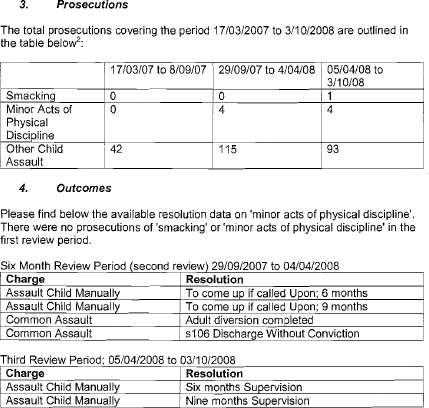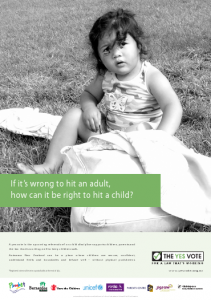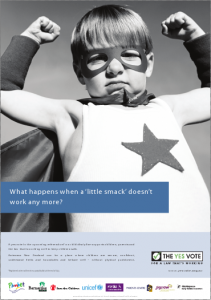June 21, 2009
Deborah Coddington (New Zealand Herald, June 21, 09) decries the “dastardly” referendum in her regular column saying it was organised “by grown men who should know better”.
She says there is no such thing as a “loving smack, just as there is no such thing as a hateful hug” adding that it was no wonder children were “not valued as individuals in this country, but instead as some sort of chattel belonging to adults”
“We do not own our children,” she says, “a fact that has yet to be driven home to those selfish individuals who fight their way through the Family Court over who has the offspring, ensuring any remaining family happiness is destroyed forever.”
She goes on to argue that she doesn’t see a future in NZ for treasured children nor respect for their presence.
She admits she gave little thought to the issue until 10 years ago when she wrote about the death of James Whakaruru and realised how “normal it was for discipline to include beating children”
She concludes asking how we would react if the question was: “Should forced sex, as part of a good marriage, be a criminal offence in New Zealand?”
June 21, 2009
In his column in the Sunday Star Times (21/6/09) Finlay Macdonald takes apart the referendum question calling it “ambiguous” and “an indictment of the intelligence of those behind it”. Instead he suggests his own question: “During a recession, should the linguistically challenged be allowed to waste taxpayers’ money on pushing their reactionary agenda?”
No thinking person, he writes, “regardless of their personal parenting philosophy” could answer the referendum’s question in good faith.
He concludes by saying: “All the law now states is that nothing in all that “justifies the use of force for the purpose of correction”. In other words, if you belt your kids just to teach them a lesson, rather than to prevent some clear and present danger or disruption, the law is not necessarily on your side.
In their continuing resistance to such healthy reform and their lamentable inability to even mount a coherent argument against it, the backers of this referendum disqualify themselves from any claim to have the best interests of children at heart.”
June 21, 2009
Media Statement: The Yes Vote Coalition 21 June 2009
Debate ahead of the August referendum on the child discipline law risks being the same polarising, wasted opportunity as it was in 2007, says the Yes Vote coalition.
“The Yes Vote welcomes the fact that all political parties, except Act, have pledged their support for the child discipline law, which came into effect two years ago today.
“While the last week has been an important demonstration that our political leaders understand the importance of retaining the law as it is, the debate has reignited some of the angry and abusive tone that characterised debate in 2007…
“The reality is that when it comes to stopping New Zealand’s appallingly high rates of child deaths and abuse by international standards, we are all on the same side,” said Yes Vote spokesperson Deborah Morris-Travers.
“Yet some of the mud slung at supporters of the current legislation obscures this important fact of national unity.
“We have never promoted the view that simply passing a law would either instantly change attitudes or national child abuse statistics. To expect that would be naïve. However, opponents of the law continually cite individual abuse cases as “evidence” the law isn’t working,” said Ms Morris-Travers.
“There is a slow shift occurring in New Zealand, which has already occurred in many countries, away from physical discipline as an acceptable element of parenting. The child discipline law has an important contribution, over time, to reducing the attitudes and behaviours that put children at risk of abuse.
“I suspect that in 10, 20, 30 years time, we will look back with the same surprise as we now look back on racial segregation, opposition to the women’s’ movement, or native forest clear-felling and we’ll wonder what this debate was all about.
“Change takes time and leadership. The Yes Vote welcomes the political leadership shown over the past week.
“We have noted the many public statements from journalists and MPs expressing disapproval of the referendum question and of the cost, however, we see this as an opportunity to better inform people about the child discipline law, how it is working two years on, and the importance of ensuring a focus on the interests of children.”
Ms Morris-Travers concluded by saying, “We look forward to constructive participation in a national debate as the referendum unfolds and we remind people there are some good reasons to vote in the referendum, to support a Yes Vote:
- To demonstrate that people are not fooled by the referendum’s tricky question.
- To continue to demonstrate to politicians that there is support for the law.
- To address attempts to undermining public confidence in the law.
- To achieve some quiet time for the law to bed down peacefully and have a positive effect on the way children are disciplined in New Zealand.
- To observe over time, and in an unbiased way, how it is working in practice.”
- Contact: Deborah Morris-Travers. Tel 0274 544 299
June 21, 2009
The value of the referendum is undermined by having a loaded and ambiguous question. It implies that a “yes” vote supports criminal sanctions being applied against good parents who lightly smack their children. I do not believe that should happen or is happening.
By voting “no” the implication is that the law should be changed. I believe the law as it is is working well and does not need to be changed. Parents who beat their children can no longer hide behind the legal defence of “reasonable force” and will, where the circumstances justify it, face charges.
Since the law has passed however, good parents have not been criminalised for giving their children a light smack, despite fears whipped up by the law’s opponents.
June 19, 2009
Recently Napier City Councillor Maxine Boag was a guest on Newstalk ZB following commentator Dr Robin Gwynn the previous day on the same topic. This is a transcript of her two-minute thought for the day.
“Good morning, I’m Napier City Councillor Maxine Boag.
This week I received a flyer with a figure looking like an orange plastic ginger-bread man asking the question “Should a smack as part of good parental correction be a criminal offence in New Zealand?”
My first reaction was: “What a dumb question!”
It’s like that old set-up question: “Have you stopped beating your wife?” In which case a “yes” answer shows you have been beating her, and a “no” is an admission that you are still beating her.
But this dumb question is what we’re being asked to vote on in a postal ballot in July. It has been prompted by a nationwide petition that was launched in response to the 2007 [changes to the] Child Discipline law. At the cost of $9 million to taxpayers, this poorly-worded referendum has been criticised by both the Prime Minister and the Leader of the Opposition, both of whom saying that they will not be voting in it, with the National-led government saying they will not be changing the law regardless of the outcome.
The question is very misleading.
First of all, many of us believe that a smack is not part of good parental correction. So if you say ‘yes’ or ‘no’ you are still agreeing that a smack is good parental correction. A recent study of pre-schoolers’ parents in Otago showed that only a tiny minority of parents actually thought smacking was a good thing for them to do, and just 9 per cent thought smacking was effective in disciplining their children. Most parents said that smacking was more to do with their own state of mind, their tiredness and frustration, than the child’s behaviour.
Secondly, since the 2007 child discipline law, the use of a “smack” has not made any parents criminals. No parents who occasionally smack lightly are being prosecuted. So if you say ‘yes’, you are saying anyone smacking their child will be considered criminals, when they’re not. If you say ‘no’ you again buy into this lie.
I heard the organiser of the petition, Larry Baldock on the radio just yesterday being asked if he could give a single example of where a parent has been criminalised for smacking a child and he couldn’t!
I rest my case.
It made me think back to my own primary school days, when I was strapped often, always for talking.
Did it work?
Did it shut me up?
I’ll leave the answer for you to decide.
I’m Maxine Boag, and that’s my thought for today.”
June 19, 2009
Thanks to modern technology, we’ve made it easy to send an email your Member of Parliament and send them a clear message in a way that a poorly worded referendum can’t.
Just click over to our email your mp page, and let our wizard help you write your email.
June 19, 2009
And another two posters for your viewing pleasure…
You’ll find more posters and free stuff on our free stuff page.
Please note: if you plan on distributing significant numbers of copies of any items from this site, please let us know so that we can include these items in our electoral return of expenses. See the notes under “Legislative requirements” in our Legal Disclaimer for more info.
Unfortunately, we don’t have the resources to post these items out to people, but you are free to download them, print them, and use them in whatever responsible way you see fit. Depending on stock levels, you may be able to get these items from your local Barnardos office.
[contact-us]
June 19, 2009
The last few days have seen many public statements from journalists and MPs expressing disapproval of the referendum question and of the cost. The Prime Minister’s reassurance that he believes the law is working well and that he will not be changing the law is very welcome. Many people say that they are “over” the debate about child discipline.
So it may be tempting to ignore the referendum altogether. But there are some excellent reasons to vote in the referendum, and support A YES Vote.
- To demonstrate that people are not fooled by the referendum’s tricky question.
- To continue to demonstrate to politicians that there is support for the law.
- To address attempts to undermining public confidence in the law.
- To achieve some quiet time for the law to bed down peacefully and have a positive effect on the way children are disciplined in New Zealand.
- To observe over time, and in an unbiased way, how it is working in practice.
If over time we find that there are cases where prosecutions would have been best avoided because they involve trivial assaults and the stress caused by prosecutions is counter-indicated lets look at measures outside law to ensure that these are handled in a compassionate way. We do not need to re-introduce a law that says some assaults on children are acceptable and that physical punishment is ok part of family discipline.
A YES Vote strengthens support for the law.
Others have commented on this as well; see The Standard’s Still Voting Yes, and Kiwipolitico’s fascinating Game Theory Analysis of Voting in the Referendum.
June 19, 2009
Family First are determined to prove that investigations and prosecutions in cases where there are suspicions of assaults on children are unwarranted and that good parents are being prosecuted because of the child discipline law. Unfortunately the information they give about the cases is not enough to make a judgement about whether or not action was warranted. Neither Police nor CYF will release information on cases. Media reports and court proceedings sometimes provide information but in reality few cases are getting to court. What Family First provide seem to be stories as told by people who are being investigated for ill-treatment of their children and not verified by independent assessment.
In the referendum question that Family First regards as valid the standard set for acceptable assault seems to be a “smack”. This definition does not address questions such as how hard, whether an implement was involved, on what part of the body, at what age, how often and administered by whom? These could all be relevant questions when considering whether a “smack” might compromise a child’s safety and sense of security.
Both the Police and CYF are required to investigate reports of alleged harm to a child and so they should. Any such reports could mean that the child is at risk. Whether there is further action after an investigation requires careful consideration of the facts. These facts could include type of force used, degree of force used, part of body affected, presence or otherwise of injury, age of child, circumstances of the harm inflicted, family history of violence and attitude of the adult(s) involved.
The Police data Family First claim to have obtained under OIA, most of which had already been published, unfortunately gives no detail about the kind of assaults involved. In the past Family First have defended the behaviour of parents whose actions have subsequently been found to be quite abusive. It is reasonable to assume that “smacking” and minor acts of physical discipline, refer to cases where section 59 might have been used as a defence (successfully or unsuccessfully) before law change. Even if there is a valid concern that it might have been obvious to the Police that these cases were low enough on the scale of violence not to warrant investigation nine cases is not a huge number – nothing like the flood of good parents being prosecuted we were warned by Family First to expect.
The third category used in police data is “other child assault”. This refers to more and heavy handed assaults and complex circumstances that no one could find reasonable or acceptable and are likely to have been prosecuted under the old law.
The sensible and compassionate sentences (called weak resolutions by Family First) imposed in the cases that have gone through court and been found guilty do not indicate that the judge took the matter lightly. It is more likely that judges have understanding of the need to set standards in law at the same time as avoiding unnecessary hardship on families.
In examining the details of the cases where investigations are reported to have taken place we must keep in mind the natural tendency of people accused to minimise their own wrongdoing and present their own side of the story. As previously stated verification of the stories is not provided and in any case on the face of it much of the adult behaviour reported seemed to indicate a problem existed.
The only real conclusions we can draw from the material provided by Family First is that there is interest in the community in reporting apparent ill-treatment of children which is a good thing, and that appropriate investigations are taking place.
- Family First’s police report:

June 19, 2009
MEDIA RELEASE
Jigsaw Family Services: 18 June 2009
Jigsaw Family Services is urging New Zealanders to put themselves in children’s shoes over the so-called smacking referendum.
“What would our children do if they were allowed to vote? Would they ask to be smacked because they thought it was good for them?” says Liz Kinley, Jigsaw’s CEO (Strategic Operations).
Jigsaw’s network of 34 community agencies employs about 500 staff to stop child abuse and family violence.
“Because children don’t have a voice in the debate it’s up to child-centred agencies to speak out on their behalf. Children are telling us they’re confused when people they love and trust hit them.
“It makes them resentful rather than relaxed and confident. And it teaches them that hitting is an acceptable way of expressing anger or disapproval.”
The controversy around the ambiguous wording of the referendum question should not deter voters from affirming the existing legislation by voting “yes”.
Liz Kinley says a “yes” vote is a vote for our children. It reinforces their right to have the same legal protection as adults.
“We don’t want parents to end up in court for a light smack and because the law gives police discretion over prosecutions that isn’t happening.
“Parents want to do the best job they can. They may have been whacked as children. They know it doesn’t work and want to treat their own children differently.”
Jigsaw’s agencies are committed to helping families find better ways to nurture and discipline children.
“The demand for our parenting programmes shows New Zealand is moving to a place where hitting children isn’t tolerated. Two decades ago we made the transition in our schools. So why not in our own homes?” says Liz Kinley.
- Contact: Liz Kinley, Jigsaw CEO (Strategic Operations), 04 385 7983 / 027 2303312 or Shona Geary, Media Adviser, 027 573 1125














